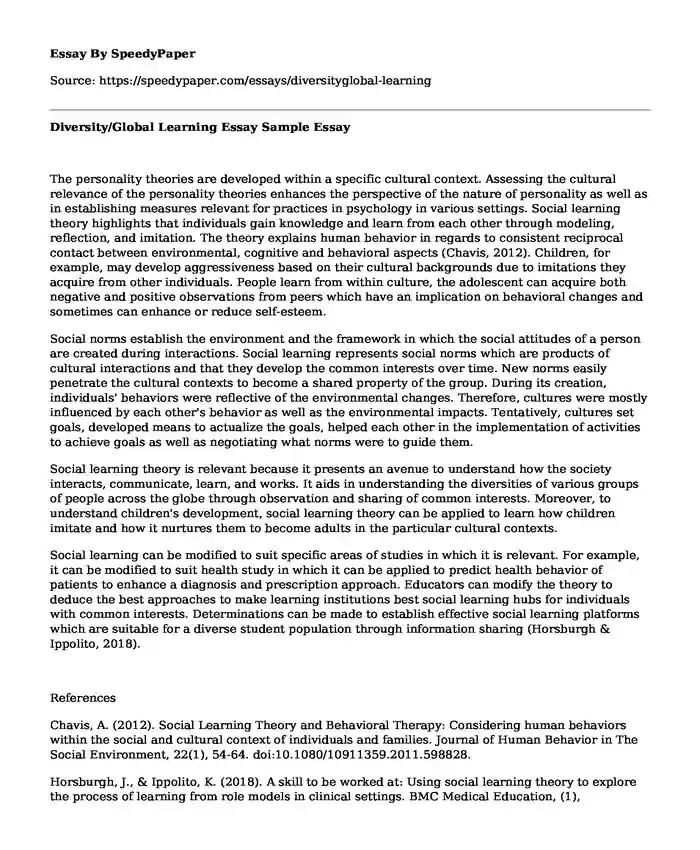The personality theories are developed within a specific cultural context. Assessing the cultural relevance of the personality theories enhances the perspective of the nature of personality as well as in establishing measures relevant for practices in psychology in various settings. Social learning theory highlights that individuals gain knowledge and learn from each other through modeling, reflection, and imitation. The theory explains human behavior in regards to consistent reciprocal contact between environmental, cognitive and behavioral aspects (Chavis, 2012). Children, for example, may develop aggressiveness based on their cultural backgrounds due to imitations they acquire from other individuals. People learn from within culture, the adolescent can acquire both negative and positive observations from peers which have an implication on behavioral changes and sometimes can enhance or reduce self-esteem.
Social norms establish the environment and the framework in which the social attitudes of a person are created during interactions. Social learning represents social norms which are products of cultural interactions and that they develop the common interests over time. New norms easily penetrate the cultural contexts to become a shared property of the group. During its creation, individuals' behaviors were reflective of the environmental changes. Therefore, cultures were mostly influenced by each other's behavior as well as the environmental impacts. Tentatively, cultures set goals, developed means to actualize the goals, helped each other in the implementation of activities to achieve goals as well as negotiating what norms were to guide them.
Social learning theory is relevant because it presents an avenue to understand how the society interacts, communicate, learn, and works. It aids in understanding the diversities of various groups of people across the globe through observation and sharing of common interests. Moreover, to understand children's development, social learning theory can be applied to learn how children imitate and how it nurtures them to become adults in the particular cultural contexts.
Social learning can be modified to suit specific areas of studies in which it is relevant. For example, it can be modified to suit health study in which it can be applied to predict health behavior of patients to enhance a diagnosis and prescription approach. Educators can modify the theory to deduce the best approaches to make learning institutions best social learning hubs for individuals with common interests. Determinations can be made to establish effective social learning platforms which are suitable for a diverse student population through information sharing (Horsburgh & Ippolito, 2018).
References
Chavis, A. (2012). Social Learning Theory and Behavioral Therapy: Considering human behaviors within the social and cultural context of individuals and families. Journal of Human Behavior in The Social Environment, 22(1), 54-64. doi:10.1080/10911359.2011.598828.
Horsburgh, J., & Ippolito, K. (2018). A skill to be worked at: Using social learning theory to explore the process of learning from role models in clinical settings. BMC Medical Education, (1), doi:10.1186/s12909-018-1251-x.
Cite this page
Diversity/Global Learning Essay Sample. (2022, Jul 06). Retrieved from https://speedypaper.com/essays/diversityglobal-learning
Request Removal
If you are the original author of this essay and no longer wish to have it published on the SpeedyPaper website, please click below to request its removal:
- Environmental Injustice: Essay Sample on the Carleton Farms Landfill
- The Struggle for Homeostasis, Literary Essay Example
- American Dream, An Illusion for Latinos, Free Essay on Civil Rights
- Free Essay: Child Development and Family Challenges
- Essay Example: Neoclassical Economics in Relation to Jeremy Bentham's Assertion
- Free Essay Example on Psychosocial Problems
- What Happens in Child and Family Social Work Supervision? - Article Analysis Essay
Popular categories





